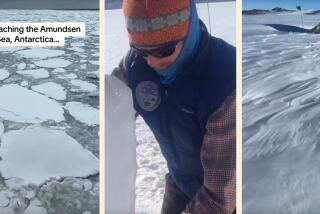The Hot New Trend: Climate Control
- Share via
When Ellie Rogers talks to customers in Ann Arbor, Mich., she often dwells as much on the dangers of global warming as on the virtues of her cosmetics and biodegradable kitchen cleaners.
“It may seem like a stretch,” allows Rogers. “But I’ll ask if they’ve noticed how hot it has been. And I’ll ask if they’re concerned about that. And eventually, I’ll tell them how more than 2,000 leading scientists around the world say it’s a human responsibility, that we’re causing this weather change.
“I’m a pest about it,” says Rogers, 73.
Yet she’s also convinced that, far from turning people away from her sales pitch, her apocalyptic warnings warm them up to it.
The marketing experts at her company, Shaklee Corp., agree. “Global warming is an ice-breaker,” sums up Ken Perkins, who masterminds the approach at the firm’s Pleasanton, Calif., headquarters.
Perkins subscribes to an argument that’s proving to be compelling for an increasing number of other U.S. and European executives: Faced with persistent news about melting ice caps, worsening storms and the likelihood that future generations will broil, the average Joe is much more anxious about the changing climate than his government may suspect. He feels powerless, afraid--and guilty. Scientists tell him he’s spewing greenhouse gases by buying products manufactured by burning oil, gas and coal, driving his car and even doing his laundry. And he has no idea how to stop.
But now, at least, Joe can vote with his wallet and buy a product whose purveyors persuade him that at least they’re doing something to counteract the crisis.
This reasoning “singles us out,” says saleswoman Rogers, who says it builds trust with customers to talk about her firm’s good works, including buying solar panels for homes in Sri Lanka. “It makes us not like just another company, and that helps business.”
Environmental consciousness is nothing new to companies like Shaklee, with its biodegradable products, and Ben & Jerry’s, the Vermont ice cream firm that this month plans to launch a sweet new concoction called “One Sweet Whirled” as part of a climate-change awareness campaign.
What’s new is that linking salesmanship with actions to counter global warming is gaining cachet among much larger, mainstream companies. Sue Hall, who counsels businesses on climate strategies as head of the Climate Neutral Network, a 2-year-old nonprofit based in Lake Oswego, Ore., says she’s making headway with a dozen Fortune 500 firms. Some executives involved in these discussions say they believe that appeals based on the climate may strike a chord even as other green marketing is on the wane.
“Recycling is passe. Toxics are passe. But global warming is different--it’s the hottest issue, no pun intended,” exudes an executive at one of the firms, a multibillion-dollar paper company planning to launch a product with a “save the climate” peg. (He asked for anonymity pending the launch date.) Sparking that kind of interest, says Hall, is a “sea change” in American society.
“For so long, people have thought global climate change was just too big to tackle,” she explains. “They’ve been worried, yes, but there was a kind of denial going on. It felt so remote in time, and arcane and technical, and then, of course, you had the scientific debate about it, which has only recently faded.”
The idea of global warming was long held suspect, the target of political scorn and skepticism. In the last few years, however, as the scientific consensus has solidified, articles linking droughts and other weather calamities to climate change are appearing more often in the mainstream press, and a grass-roots movement to fight climate change has gained momentum, spurred by churches, college campuses and scores of city governments.
In that context, Hall and other environmentally oriented consultants contend that associating one’s company with action on climate change reaps not only good karma but profits.
“People are coming out of their denial and reaching for solutions,” Hall says. “But they see an absence of solutions at the government level.”
The Climate Neutral Network aims to soothe that frustration by channeling the energy elsewhere--into buying, that is. But only buying products that are branded “Climate Cool.”
That trademark, bestowed to date on a line of carpeting from Interface Inc., rooms at a Boston hotel, services from the Better World Travel Agency, the entire operations of Shaklee Corp. and even, most recently, the 2002 Winter Olympics, is awarded only after the firms or event organizers jump through the following hoops.
First, they measure their “footprint” of greenhouse gas emissions--how much their operations produce a year. Then they reduce those emissions as much as possible at the source. To compensate for what remains--and get their net impact on the climate down to zero--they pay to reduce greenhouse gases somewhere else. Those projects, called “offsets,” can score extra philanthropic public relations points, with efforts such as Better World Travel’s investments in upgrading the heating equipment in Portland schools, which saved money on the school’s energy bills.
In Great Britain, where climate-oriented marketing was born about five years ago, Avis Rental Cars, Mazda U.K., the rock band Pink Floyd and firms selling funeral plans have followed a similar approach, marketing products and events paired with contributions to counter climate change. The cause, says John Shopley, CEO of Future Forests, the for-profit group that manages most of these clients, has been taken up by 125 corporations and 12,000 individuals who have paid to “cancel” the greenhouse gas emissions from activities including weddings and bar mitzvahs.
Eric Olson, a Climate Neutral Network consultant, tells corporate chiefs that branding themselves as climate-conscious is a great way to rise above the herd and attract customers whose concerns about environmental issues are growing. In particular, he cites research on consumers whose preferences place them in a group known as Lifestyles of Health and Sustainability, representing about 63 million adults. A recent Harris Interactive survey found nearly 82% of these environmentally minded consumers say they would pay up to 20% more for healthy and sustainable products.
“The whole idea behind green marketing is that someone may not have time to be an activist but at least can express their values in how they buy things,” Olson says.
The notion of consuming for the sake of the environment can make for strange bedfellows. Hall and Olson report that two major airlines and a large oil company are intrigued by the idea of a Climate Cool purchasing card. Yet the notion of “green gas” is the kind of extreme that makes many environmentalists nervous.
“This is a good idea lots of people are abusing,” says Carl Pope, executive director of the Sierra Club. “There’s a lot of hype out there.” With the Winter Olympics, for example, Pope said, the Sierra Club had lobbied organizers to encourage mass transit. Instead, he said, the state of Utah built new freeways to cope with the event. “Where’s the ‘climate neutral’ in that?” he asked.
“Look, it’s clearly absurd to say the more climate-cool gas you’re burning, the more good you’re doing, but that’s not our message,” responds Olson, the Climate Neutral Network business strategy expert. The more important signal, he maintains, is that pollution has a price, which should somehow be made part of our economic reckoning. And the companies that agree voluntarily to pay it, by conscientious investments, will win consumers’ hearts.
Back in Ann Arbor, Ellie Rogers has a more straightforward agenda. Personally, though she’s a top distributor for her company, she’s just as interested in winning converts to her climate-change cause as in using climate arguments to sell products.
“You’ve heard how a butterfly flapping its wings in one place can cause a hurricane somewhere else?” she asks. “Well, Shaklee has 500,000 distributors. If each of them tells five who tell five who tell five, pretty soon you’ve got a movement.”
More to Read
Inside the business of entertainment
The Wide Shot brings you news, analysis and insights on everything from streaming wars to production — and what it all means for the future.
You may occasionally receive promotional content from the Los Angeles Times.









